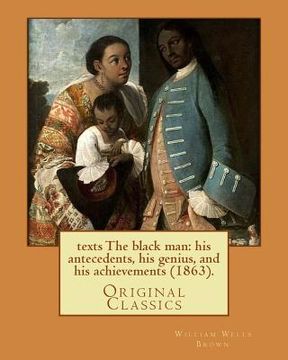The black man: his antecedents, his genius, and his achievements (1863). By: William Wells Brown: (Original Classics) (en Inglés)
Reseña del libro "The black man: his antecedents, his genius, and his achievements (1863). By: William Wells Brown: (Original Classics) (en Inglés)"
William Wells Brown (circa 1814 - November 6, 1884) was a prominent African-American abolitionist lecturer, novelist, playwright, and historian in the United States. Born into slavery in Montgomery County, Kentucky, near the town of Mount Sterling, Brown escaped to Ohio in 1834 at the age of 20. He settled in Boston, Massachusetts, where he worked for abolitionist causes and became a prolific writer. While working for abolition, Brown also supported causes including: temperance, women's suffrage, pacifism, prison reform, and an anti-tobacco movement. His novel Clotel (1853), considered the first novel written by an African American, was published in London, England, where he resided at the time; it was later published in the United States. Brown was a pioneer in several different literary genres, including travel writing, fiction, and drama. In 1858 he became the first published African-American playwright, and often read from this work on the lecture circuit. Following the Civil War, in 1867 he published what is considered the first history of African Americans in the Revolutionary War. He was among the first writers inducted to the Kentucky Writers Hall of Fame, established in 2013. A public school was named for him in Lexington, Kentucky. Brown was lecturing in England when the 1850 Fugitive Slave Law was passed in the US; as its provisions increased the risk of capture and re-enslavement, he stayed overseas for several years. He traveled throughout Europe. After his freedom was purchased in 1854 by a British couple, he and his two daughters returned to the US, where he rejoined the abolitionist lecture circuit in the North. A contemporary of Frederick Douglass, Brown was overshadowed by the charismatic orator and the two feuded publicly... Brown stayed abroad until 1854. Passage of the 1850 Fugitive Slave Law had increased his risk of capture even in the free states. Only after the Richardson family of Britain purchased his freedom in 1854 (they had done the same for Frederick Douglass), did Brown return to the United States. He quickly rejoined the anti-slavery lecture circuit. Perhaps because of the rising social tensions in the 1850s, Brown became a proponent of African-American emigration to Haiti, an independent black republic in the Caribbean since 1804. He decided that more militant actions[clarification needed] were needed to help the abolitionist cause. During the American Civil War and in the decades that followed, Brown continued to publish fiction and non-fiction books, securing his reputation as one of the most prolific African-American writers of his time. He also helped recruit blacks to fight for the Union in the Civil War. He introduced Robert John Simmons from Bermuda to the abolitionist Francis George Shaw, father of Colonel Robert Gould Shaw, the commanding officer of the 54th Massachusetts Volunteer Infantry Regiment. While continuing to write, Brown was active in the Temperance movement as a lecturer. After studying homeopathic medicine, he opened a medical practice in Boston's South End while keeping a residence in Cambridge. In 1882 he moved to the nearby city of Chelsea. William Wells Brown died on November 6, 1884 in Chelsea, Massachusetts at the age of 70.....

